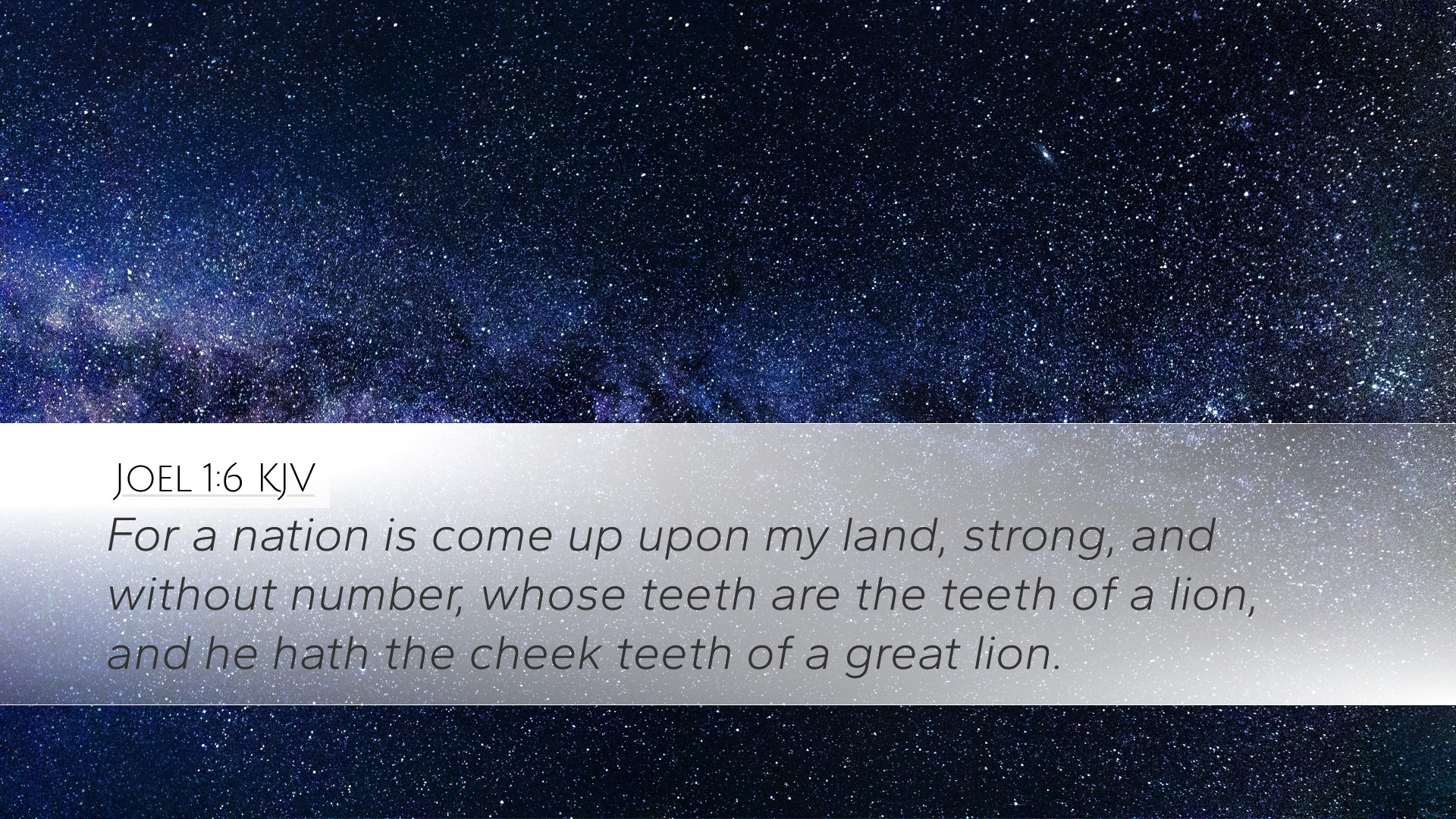Old Testament
Genesis Exodus Leviticus Numbers Deuteronomy Joshua Judges Ruth 1 Samuel 2 Samuel 1 Kings 2 Kings 1 Chronicles 2 Chronicles Ezra Nehemiah Esther Job Psalms Proverbs Ecclesiastes Song of Solomon Isaiah Jeremiah Lamentations Ezekiel Daniel Hosea Joel Amos Obadiah Jonah Micah Nahum Habakkuk Zephaniah Haggai Zechariah MalachiJoel 1:6
Joel 1:6 KJV
For a nation is come up upon my land, strong, and without number, whose teeth are the teeth of a lion, and he hath the cheek teeth of a great lion.
Joel 1:6 Bible Commentary
Commentary on Joel 1:6
Joel 1:6 states:
"For a nation has come upon My land, strong and without number; His teeth are the teeth of a lion, and He has the fangs of a fierce lion."
Introduction
This verse serves as a pivotal point in the Book of Joel, heralding a dire warning concerning the impending judgment of God upon His people. The imagery employed here reflects both the literal devastation brought by locusts and a figurative depiction of judgment, making this verse deeply significant for understanding divine retribution and human sin.
Exegesis
As one delves into the meanings and implications of this verse, it is essential to consider the historical and theological context.
- Historical Context: Joel addresses the people of Judah during a time of crisis, likely following a devastating locust plague which symbolizes broader judgment and calamity.
- Theological Context: The mention of a "nation" serves as a metaphor for God’s tools of judgment. The imagery of ferocity invokes the notion of divine discipline.
Commentary Insights
Several renowned commentators provide a rich tapestry of insights regarding this verse.
Matthew Henry
Henry's insightful analysis reveals the significance of this verse in illustrating divine judgment. He elucidates that the "nation" is an army sent by God to execute judgment. Here, the ferocity of the locusts reflects the power of God in punishing the people for their sins.
Albert Barnes
Barnes expands on this concept by asserting that the locusts symbolize a large and unwieldy force, likening them to an invading army. His commentary suggests that the destruction caused by these pests serves as a representation of spiritual decay among the people, signaling their need for repentance and turning back to God.
Adam Clarke
Clarke provides a vivid interpretation of the text, emphasizing the physical devastation that the locusts bring. He elaborates that the description of their teeth as those of a lion conjures images of fierce and complete destruction, pointing to both the literal and spiritual implications of such devastation on the people of God.
Theological Reflections
This verse invites deeper theological reflection on the nature of God's judgment:
- The Sovereignty of God: The fact that God ordains such judgments illustrates His supreme authority over creation and history.
- The Call to Repentance: Implicit in this warning is the call for Israel to recognize their transgressions and return to the covenantal relationship with God.
- The Nature of Judgment: The ferocity of the judgment signifies not merely retribution but the desire for restoration and renewal among God’s people.
Conclusion
In summary, Joel 1:6 serves not only as a poignant reminder of the consequences of disobedience and sin but also emphasizes God’s desire for His people to return to Him in repentance. The anthropomorphic imagery used to describe the locusts provides a stark illustration of the devastation of sin and the urgent need for divine intervention in the lives of believers.
For pastors, students, and scholars, Joel 1:6 stands as a somber yet hopeful call to delineate the gravity of sin and the richness of God's mercy extended through the call to repentance.


